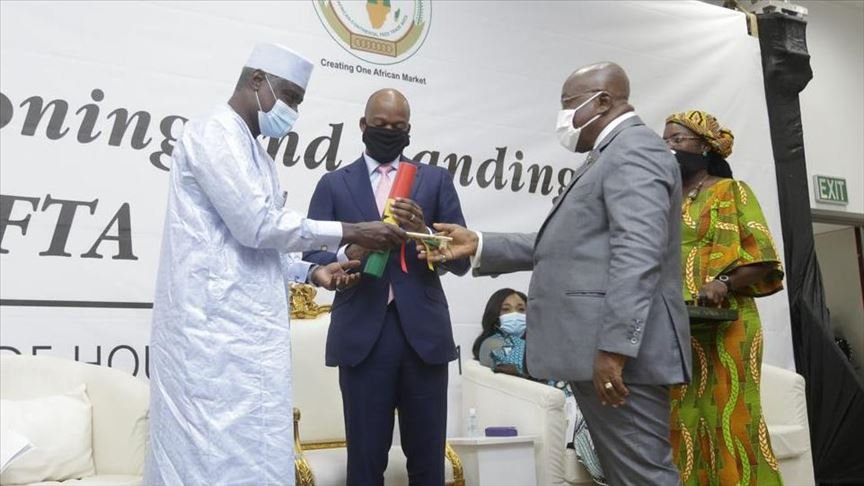Highlights
- The African Continental Free Trade Area (AfCFTA) presents a major opportunity for African countries to bring 30 million people out of extreme poverty and to raise the incomes of 68 million others who live on less than $5.50 per day.
- With the implementation of AfCFTA, trade facilitation measures that cut red tape and simplify customs procedures would drive $292 billion of the $450 billion in potential income gains.
- Implementing AfCFTA would help usher in the kinds of deep reforms necessary to enhance long-term growth in African countries.
The African Continental Free Trade Area (AfCFTA) agreement will create the largest free trade area in the world measured by the number of countries participating. The pact connects 1.3 billion people across 55 countries with a combined gross domestic product (GDP) valued at US$3.4 trillion. It has the potential to lift 30 million people out of extreme poverty, but achieving its full potential will depend on putting in place significant policy reforms and trade facilitation measures.
The scope of AfCFTA is large. The agreement will reduce tariffs among member countries and cover policy areas such as trade facilitation and services, as well as regulatory measures such as sanitary standards and technical barriers to trade. Full implementation of AfCFTA would reshape markets and economies across the region and boost output in the services, manufacturing and natural resources sectors.
As the global economy is in turmoil due to the COVID-19 pandemic, creation of the vast AfCFTA regional market is a major opportunity to help African countries diversify their exports, accelerate growth, and attract foreign direct investment.
The World Bank report, The African Continental Free Trade Area: Economic and Distributional Effects, is designed to guide policymakers in implementing policies that can maximize the agreement’s potential gains while minimizing risks. Creating a continent-wide market will require a determined effort to reduce all trade costs. Governments will also need to design policies to increase the readiness of their workforces to take advantage of new opportunities.
“Creating a single, continent-wide market for goods and services, business and investment would reshape African economies. The implementation of AfCFTA would be a huge step forward for Africa, demonstrating to the world that it is emerging as a leader on the global trade agenda.”

Caroline FreundGlobal Director of Trade, Investment and Competitiveness
“The African Continental Free Trade Area has the potential to increase employment opportunities and incomes, helping to expand opportunities for all Africans. The AfCFTA is expected to lift around 68 million people out of moderate poverty and make African countries more competitive. But successful implementation will be key, including careful monitoring of impacts on all workers—women and men, skilled and unskilled—across all countries and sectors, ensuring the agreement’s full benefit.”

Albert ZeufackChief Economist, Africa
Key Findings
The African Continental Free Trade Agreement represents a major opportunity for countries to boost growth, reduce poverty, and broaden economic inclusion. Implementing AfCFTA would:
- Lift 30 million Africans out of extreme poverty and boost the incomes of nearly 68 million others who live on less than $5.50 a day;
- Boost Africa’s income by $450 billion by 2035 (a gain of 7 percent) while adding $76 billion to the income of the rest of the world.
- Increase Africa’s exports by $560 billion, mostly in manufacturing.
- Spur larger wage gains for women (10.5 percent) than for men (9.9 percent).
- Boost wages for both skilled and unskilled workers—10.3 percent for unskilled workers, and 9.8 percent for skilled workers.
Under AfCFTA, extreme poverty would decline across the continent—with the biggest improvements in countries with currently high poverty rates.
- West Africa would see the biggest decline in the number of people living in extreme poverty—a decline of 12 million (more than a third of the total for all of Africa).
- Central Africa would see a decline of 9.3 million.
- Eastern Africa would see a decline of 4.8 million.
- Southern Africa would see a decline of 3.9 million.
- Countries with the highest initial poverty rates, would see the biggest declines in poverty rates.
- In Guinea-Bissau, the rate would decline from 37.9 percent to 27.7 percent
- In Mali, the rate would decline from 14.4 percent to 6.8 percent.
- In Togo, it would decline from 24.1 percent to 16.9 percent.
Of the $450 billion in income gains from AfCFTA, $292 billion would come from stronger trade facilitation—measures to reduce red tape and simplify customs procedures.
- Tariff liberalization is important, but by itself it would boost the continent’s income by just 0.2 percent.
- Adding trade facilitation to the mix—including measures to reduce red tape, simplify customs procedures, and make it easier for African businesses to integrate into global supply chains—would boost the income gains by $292 billion.
- These gains will require major efforts by countries to reduce the burden on businesses and traders to cross borders, quickly, safely, and with minimal interference by officials.
The World Bank report is designed to guide policymakers in implementing policies that can maximize the agreement’s potential gains while minimizing risks.
- Creating a continent-wide market will require a determined effort to reduce all trade costs. In general, this will require legislation and regulations to enable the free flow of goods, capital and information across borders; create competitive business environments that can boost productivity and investment; and promote increased foreign competition and foreign direct investment that can raise productivity and innovation by domestic firms.
- In a few sectors facing job losses, governments will need to be ready to support workers with adequate safety nets and policies to retrain workers.
- Governments will need to design policies to increase the readiness of their workforces to take advantage of new opportunities.
Achieving the gains from AfCFTA is especially important due to the COVID-19 pandemic, which is expected to cause up to $79 billion in output losses in Africa in 2020 alone.
- COVID-19 has caused major disruptions to trade across the continent, including in critical goods such as medical supplies and food.
- By increasing regional trade, lowering trade costs and streamlining border procedures, full implementation of AfCFTA would help African countries increase their resiliency in the face of future economic shocks and help usher in the kinds of deep reforms that are necessary to enhance long-term growth.
Credit of the story goes to Word Bank
Go to the links to get DATA and about the authors of this story











0 Comments